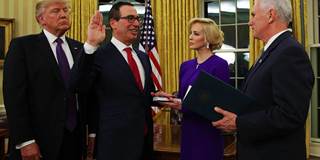Powerful people do well from booms and busts, and the Goldman Sachs alumni serving in top US government posts are determined to see that they do. The rest of us can expect deeper inequality and more crisis-induced poverty.
WASHINGTON, DC – In early 2007, the worst financial crisis in almost 80 years began to unfold, coming to a head 18 months later with the collapse of Lehman Brothers and shock waves felt around the world. Desperate government measures saved us from Great Depression II, and officials vowed “never again” would we face the same risks. Politicians and central banks embarked on a broad process of national-level reform and international coordination – all intended to reduce the chance that very large banks could collapse.
A decade later, the global financial system has in some ways become safer as a result of these efforts. In other ways, however, the structure has not changed much – and may even have become more vulnerable. But, instead of completing the reform process, policymakers on both sides of the Atlantic seem determined to undo most of the measures underpinning what progress has been achieved.
The past decade has yielded three main accomplishments. First, some financial firms failed, and for good reason: their business models were bad, they were badly run, or both. At the same time, stronger financial firms expanded their market share.

WASHINGTON, DC – In early 2007, the worst financial crisis in almost 80 years began to unfold, coming to a head 18 months later with the collapse of Lehman Brothers and shock waves felt around the world. Desperate government measures saved us from Great Depression II, and officials vowed “never again” would we face the same risks. Politicians and central banks embarked on a broad process of national-level reform and international coordination – all intended to reduce the chance that very large banks could collapse.
A decade later, the global financial system has in some ways become safer as a result of these efforts. In other ways, however, the structure has not changed much – and may even have become more vulnerable. But, instead of completing the reform process, policymakers on both sides of the Atlantic seem determined to undo most of the measures underpinning what progress has been achieved.
The past decade has yielded three main accomplishments. First, some financial firms failed, and for good reason: their business models were bad, they were badly run, or both. At the same time, stronger financial firms expanded their market share.